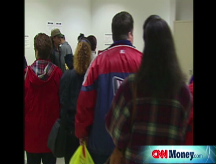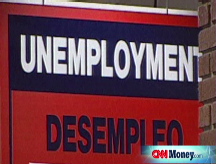House passes jobless benefits extension
On second try, House extends unemployment benefits beyond the 6-month limit; measure still faces uphill fight to final approval.

NEW YORK (CNNMoney.com) -- A measure to extend unemployment benefits from 26 weeks to 39 weeks passed the House on a second try Thursday but the bill still faces numerous hurdles.
The measure fell three votes short of the two-thirds majority vote needed for approval Wednesday but only a simple majority was needed for passage Thursday.
The measure will help many of the country's 1.6 million job seekers who have been out of work more than six months and have therefore seen their unemployment benefits run out.
Les Tarlton is one of them. He's been out of work since the end of 2003, when the suburban Dallas resident was laid-off by Swedish cell phone maker Ericsson.
He's been unable to find any other job in the communications industry since then. In order for his family to get by, his wife went back to work and they've had to draw down on savings and 401(k) balances.
For Tarlton, an extension of unemployment benefits would be welcome even though it wouldn't solve his financial problems. He received about $800 a month in unemployment - a sharp drop from the six-figure salary he used to make. But it would help his family deal with their rising expenses.
"I don't want welfare. I just want to work and do my normal job taking care of my kids and family," Tarlton said. "But any temporary relief helps."
Still, despite Thursday's success in the House, it's unclear if benefits will actually be extended.
The Bush administration is opposed to the proposal and it is unclear if Democrats will be able to win the support they need to get passed an expected Republican filibuster in the Senate.
The Senate Democrats have made an extension a priority though and said they might attach it to a measure to fund the Iraq war if they can't win approval of a stand-alone bill.
Bush did sign off on an extension of benefits when it passed in 2002. But Edward Lazear, chairman of the White House Council of Economic Advisers argued earlier this year that benefits have never been extended when unemployment was been below 5.7%, and that typically it has been closer to 7% when the benefits were extended in the past.
Still, some groups are reluctant to actively oppose a benefit extension at a time when there is talk of recession. Neither the U.S. Chamber of Commerce nor the National Federation of Independent Businesses would comment on the proposal Thursday.
Democrats argue that it's clear that something needs to be done. There are a lot more Les Tarltons than there used to be.
According to the government's May jobs report, there was a 36% jump in the number of unemployed who have been out of works for 27 or more weeks. It's the biggest such jump in more than five years.
And experts say it's only going to get worse. The overall unemployment rate experienced its biggest jump in 22 years in May, from 5% to 5.5%. And the four-week average for people receiving unemployment benefits edged up to a four-year high of just over 3 million.
The percentage of job seekers who have been unemployed for 26 or more weeks is down from the 22% seen during the last recession. It was at 18.3% in the latest reading. But that current level still represents recessionary levels, said Ross Eisenbrey, vice president of the Economic Policy Institute, a labor-supported Washington think tank.
"Wait six months and I expect that we'll be there at the 2002 level," said Eisenbrey.
Eisenbrey concedes that extending benefits will lead some workers to stay unemployed longer, as they continue to seek a job closer to pay of the one they lost, rather than taking a much lower-paying job. But that's not a bad thing, he argues.
"Ideally, from a national economic point of view, we don't want people who are engineers taking jobs at Wal-Mart," he said. "We'd rather have them keep looking and find an engineering job. It hurts our national productivity."
Eisenbrey argues even if the number of long-term unemployed jumps further with an extension of benefits, he said the benefits are low enough to give a strong incentive to workers to find a job.
"The average benefit is $300 a week, which is a poverty-level income," he said.
He points out that Denmark grants up to four years of benefits, at a level much closer to the pay unemployed Danish workers used to receive than benefits in the United States. But Denmark's unemployment rate is only 1.8%.
"There's no relationship between having a relatively generous unemployment benefit and having high unemployment," Eisenbrey said.
The proposal for extended benefits would cost about $13 billion in the next year. The money would come out of a federal trust fund supported by modest payments made by every employer, based upon the number of employees they have.
Most employers pay about $1 per employee per week into the federal trust fund, which has more than $30 billion in it currently.
Most unemployment insurance premiums and benefits are handled by the states. Employers make state payments that average $264 a year per employee, or about $5 per employee per week. ![]()





